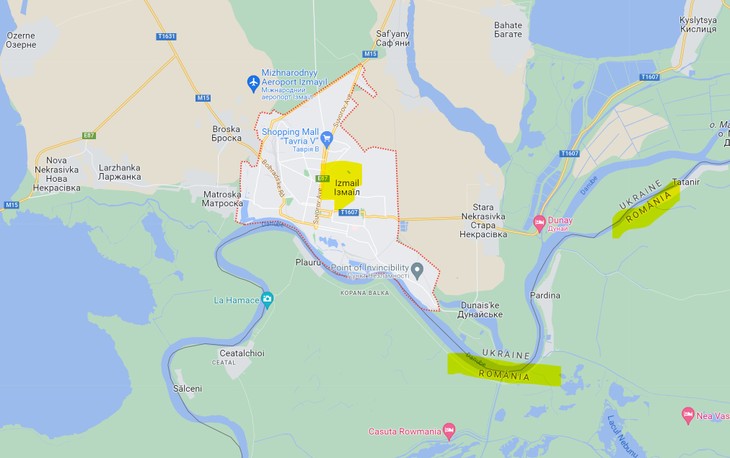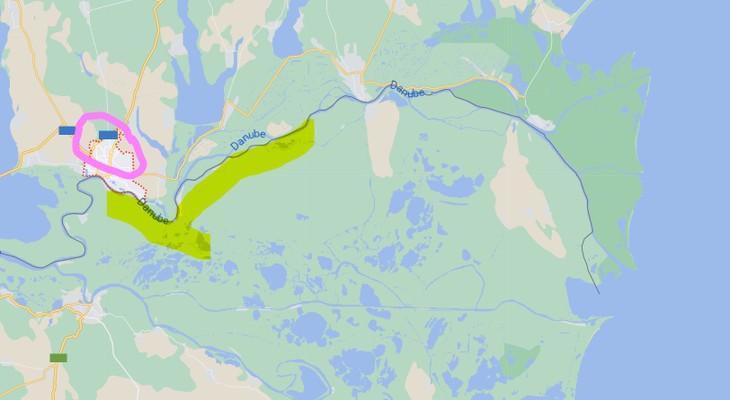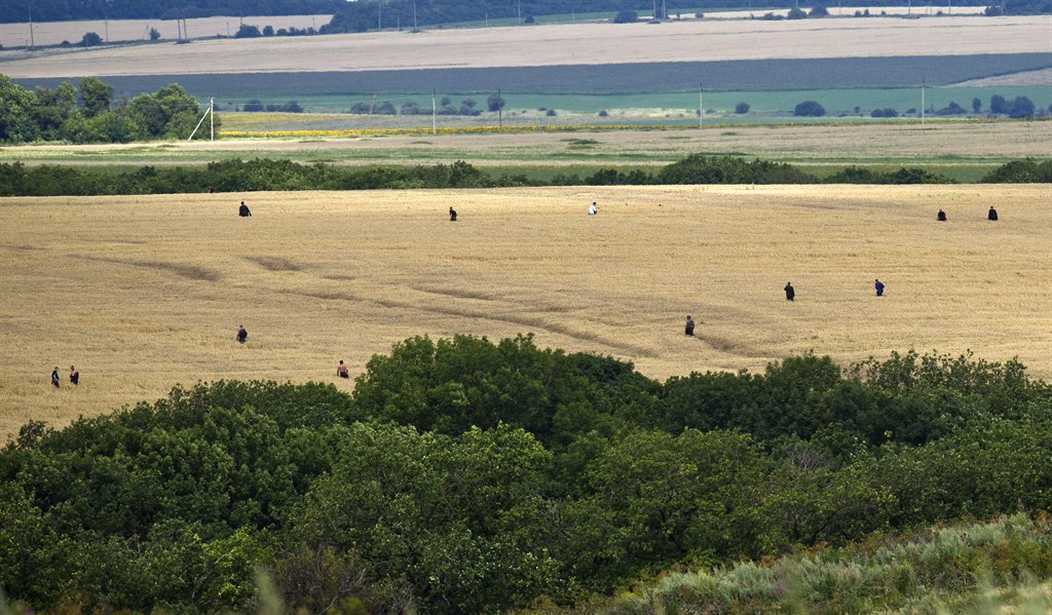I guess when Russia doesn’t want you shipping grain, they make it pretty clear – whatever their pablum about starving people in Africa – that you won’t be shipping any grain.
They got their point across last night on the banks of the Danube with drone strikes on the Ukrainian inland port of Izmail.
Russia attacked Ukraine's main inland port of Izmail on the Danube River. The strikes pushed up global food prices as Moscow ramped up its use of force to prevent Ukrainian grain exports https://t.co/SInMx14a3b pic.twitter.com/3BjulnRMNs
— Reuters (@Reuters) August 2, 2023
And the port sure is snugged right on the Romanian border…

…Izmail had also been attacked in late July. An airstrike at that location is particularly provocative and dangerous, given it sits just on the border with NATO member Romania. Romania vehemently condemned that attack as “unacceptable”.
Lucky thing they were accurate, no?

There was quite a bit of grain stored in those warehouses which has all apparently been destroyed.
Russia attacked Ukraine’s main inland port across the Danube River from Romania on Wednesday, sending global food prices higher as it ramps up its use of force to prevent Ukraine from exporting grain.
The attacks destroyed buildings in the port of Izmail and halted ships as they prepared to arrive there to load up with Ukrainian grain in defiance of a de-facto blockade Russia reimposed in mid-July.
Ukrainian deputy prime minister Oleksandr Kubrakov said the Russian drone attacks damaged almost 40,000 tons of grains which had been destined for countries in Africa as well as China and Israel.
…There were no reports of casualties, Odesa regional governor Oleh Kiper wrote in a post on the Telegram messaging app.
Commercial ship-tracking data showed dozens of international ships halting and dropping anchor at the mouth of the Danube, many of them registered to arrive in Izmail in an apparent attempt to breach Russia’s blockade.
The port, across the river from NATO-member Romania, is the main alternative route out of Ukraine for grain exports, since Russia’s blockade halted traffic at Ukraine’s Black Sea ports in mid-July.
Obviously, operations at the port were suspended and that in itself was causing problems. Ships running the Russian blockade are now being forced to anchor up river or at the mouth of the Danube itself while port operations get moving again and adjust to the limitations the strike imposed on them.
They look like a little cluster of sitting ducks. You know the crews on those boats are not happy.
Footage of Ships along the Danube. pic.twitter.com/DGRACphkCp
— OSINTdefender (@sentdefender) July 24, 2023
Wheat prices on the Chicago commodities market spiked on the news as well.

Vladimir Putin has reportedly spoken to Tayyip Erdogan, president of Turkey and the grain export deal’s sponsor. It’s said Putin told Erogan that the strikes were in retaliation for Ukrainian strikes on a bridge used to resupply Russian troops and that the Russians want to rejoin the grain shipments, but on their terms, of course. They want their fertilizer sales included.
…The Kremlin said Putin reiterated Russia’s condition for rejoining the grain deal: that a parallel deal improving terms for its own food and fertiliser exports be implemented. Those exports are already exempt from sanctions, which the West says Moscow aims to undermine by threatening the global food supply.
Ukraine, known as the breadbasket of Europe, has been taken a pounding as far as grain exports, and by extension, so have grain prices and the level of food insecurity that developing nations have.
…Ukraine’s Danube river ports such as Izmail accounted for around a quarter of grain exports before Russia pulled out of the Black Sea deal, and have since become the main route out, with grain loaded onto barges and shipped to Romania’s Black Sea port of Constanta for shipment onwards.
Kyiv’s goal is for international ships to go straight there and load up directly, while Moscow says it will treat ships heading to Ukrainian seaports as potential military targets.
The United Nations has warned of a potential food crisis in the world’s poorest countries due to Russia’s decision to abandon the deal, brokered by the U.N. and Turkey.
Ukrainian officials say Moscow has hit 26 port facilities, five civilian vessels and 180,000 tonnes of grain in nine days of strikes since quitting the grain deal.
Compared to June’s numbers, Ukraine’s grain exports are down 40% since the collapse of the export deal mid-July. All the additional boats backed up waiting are going to aggravate an already bad situation. They need to move those foodstuffs out.
Since the deal collapsed, wheat is up 10% and gotten yet another bump with today’s Russian attack.
Any further disruption has an impact on the rest of Europe and the world – as global wheat prices will increase if there’s a hold up in trade.
…Prices of wheat are up more than 10% since the deal enabling grain shipments to safely leave Black Sea ports collapsed.
…There’s been speculation that this week’s strikes have caused a backlog, but Richard Meade, Editor-in-Chief of Lloyd’s List, says they’ve just exacerbated the congestion that’s been there since the start of the war.
“Without the [Black Sea grain deal], exports are heading to the south but there is a physical limitation on how many ships you can get through a narrow river corridor,” says Mr Meade.
Moscow and Kyiv have both threatened to treat some commercial vessels as military targets, which has added to tensions in the shipping industry.
…Lloyd’s List say the increased risk at Danube ports has left traders assessing the viability of remaining Ukraine grain export routes.
There are land routes where grain could be taken by truck or rail, but agriculture experts say this wouldn’t be quick or cheap to facilitate.
Overland, by truck or rail, is the only alternative and at nowhere near the volume shipping achieves. Should insurers dry up or hostilities truly commence, they may switch to that, but it will only be a temporary fix if the Russians don’t choose to play nice.
…”If they are hell-bent on stopping grain exports out of Ukraine then will they start to attack the rail infrastructure, they haven’t yet but the logical next step is the railways,” he says.
Africa and the Far East will be watching nervously for the next few weeks. They don’t have a Plan B if they can’t get Ukrainian grains
And I’m sure commodities traders are biting their bottom lips. The trading on the floor could be insane.








Join the conversation as a VIP Member